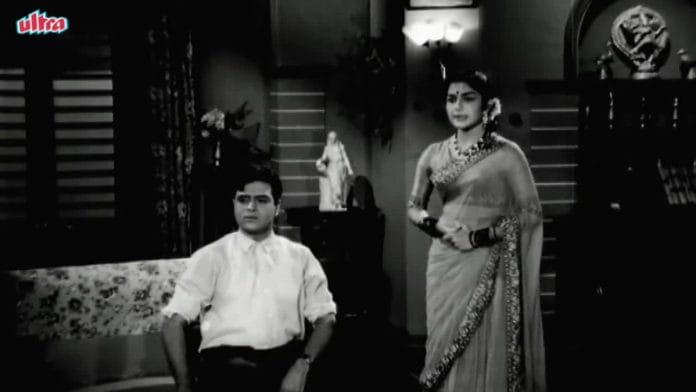By the time writer-producer-director SS Vasan’s Gharana hit theatres in 1961, actor Lalita Pawar had already built a strong reputation for playing complex matriarchal roles in films like Dahej (1952), Shri 420 (1955), and Anari (1959). With Gharana, she came to embody the archetype of the ‘dadi amma’ in Indian cinematic memory.
Pawar plays Shanta, a stern matriarch who rules her house and its members — including her husband (Bipin Gupta), her two sons Kailash (Raaj Kumar) and Kamal (Rajendra Kumar), and their wives, Sita (Devika Rani) and Usha (Asha Parekh).
There is also a widowed daughter-in-law, Gauri, with her two sons, and Shanta’s daughter Bhairavi (Shobha Khote), who often manipulates her mother against the daughters-in-law. Gharana draws the viewer in with the daily tensions of a joint family, where the women are reprimanded for every small ‘sin’ — be it serving food late or simply spending time with their husbands.
Shanta, however, is unusually tender and fiercely protective of her own daughter. She outright refuses to send Bhairavi to her in-laws, claiming even the father-in-law’s singing is too much for her daughter to endure.
“Meri beti us ghar mein nahin jayegi. Uske kaan kharab ho jayenge sur sun sunke.” (“My daughter will not go to that house. Her ears will get ruined listening to all that singing.”) The irony of the situation is lost on her.
In Vasan’s hands, the movie escapes the melodrama of saas-bahu soaps. Nor are the women reduced to caricatures of viciousness. Instead, Gharana shines a light on the deeply ingrained societal hypocrisy where families mistreat their daughters-in-law while fiercely protecting their own daughters.
Also read: Lalita Pawar — Bollywood’s wicked mother-in-law who we all loved to hate
Love-hate relationship
The narrative tension escalates when Bhairavi falsely accuses Sita of having an affair with her brother-in-law Kamal. Kailash, consumed by jealousy, leaves home and threatens to kill himself. Parallelly, Kamal pressures their father to reclaim authority from Shanta’s dictatorship.
Amid all this melodrama, it is Pawar who stands tall with her performance. She gives Shanta moments of complexity and vulnerability, particularly in scenes where the harsh matriarch shows a softer side. When she learns that Sita is pregnant, her anger melts into tenderness. In another scene, when Kailash storms out of the house, Shanta instantly blames Sita. But the moment Sita breaks down at her feet, Shanta strokes her hair in affection.
Shanta is shaped by tradition, fear of dishonour, and a rigid need for control. These subtle glimpses into her emotional core offered a layered portrayal that rises above a caricature of cruelty.
Gharana thrives as a quintessential family melodrama, much like Hum Saath Saath Hain, rooted in conflict, reconciliation, musical richness, and moral transformation.
But the film isn’t without flaws. Certain characters, especially Sita, may feel underwritten and naïve. Her forgiving nature is idealised to the point where she is reduced to the role of the angel of the house.
“Jab meri zindagi mere pati ke kaam nahin aayi, toh kya fayeda is zindagi ka (When my life was of no use to my husband, then this life has no meaning at all),” says a heartbroken Sita as Kailash walks away from her.
Also read: ‘Duchess of Depression’ Leela Chitnis paved the way for Nirupa Roy, Lalita Pawar in Bollywood
Music does the heavy-lifting
Music serves as an emotional punctuation in Gharana. The soundtrack ranges from romantic to devotional to playful, with songs like “Husnwale Tera Jawab Nahin”, “Jabse Tumhe Dekha Hai”, and “Jai Raghunandan”.
But the song that remained popular for decades was “Dadi Amma”, sung by Asha Bhosle and Shamshad Begum, composed by Ravi, , and written by Shakeel Badayuni.
The number is playful and light-hearted, sung by the younger generation in the family as they appeal to the strict grandmother to forgive them. It’s a situation every Indian household can relate to.
The lyrics capture a sense of affectionate rebellion and generational tension: “Dadi Amma Dadi Amma Maan Jao, Nahin To Munna Rote Rote So Jayega.” (“Grandmother, please give in; otherwise, Munna will cry himself to sleep.”)
Pawar’s stern yet slightly amused reaction strikes a chord.
It was a rare moment of vulnerability — not just for Shanta, but for every dadi amma in Indian cinema.
Director: SS Vasan
Cast: Rajendra Kumar Tuli, Raaj Kumar, Asha Parekh, Lalita Pawar
Writers: Shakeel Badayuni, Mukhram Sharma, MS Visvanathan
Music: Ravi
(Edited by Prashant)






